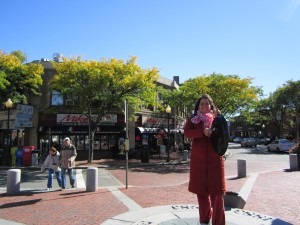This is the webpage of Mayo Fuster Morell Doctoral period, for her actual website as consolidated researcher please visit www.mayofuster.name Welcome to the web-blog of Mayo Fuster Morell postdoctoral fellow at the Berkman center for Internet & Society (Harvard University) and the Institute of Goverment and Public Policies (Autonomous University of Barcelona), and promotor of Building Digital Commons (www.digital-commons.net). Here you can find my CV, my research works and blog posts on issues such as common-base peer production, online communities governance, techno-political tools, social movements, and on my social justice and digital rights activism. I hope you find it useful!. |
Active citizenship and peer production of contra-expertise: A growing phenomenon?
This year, as most of you know, I am a happy Fellow at the Berkman Center for Internet and Society. Together with other Fellows, including Eric Gordon, a great promoter of games for civic action, and others great Berkman fellows, we have a group called “Individual Networked”, where we discuss civic engagement and new technologies weekly. This week, I presented a very preliminary thought on what I would call peer production contra-expertise, and we had a great discussion that I tried to sum up here.
The new technologies of information and communication (ICTs) are being adopted in order to organize protests; the late mobilization wave in which we have observed this adoption includes cases such as Occupy Wall Street, Spanish Indignad@s/15, and the Arab Spring. The new technologies are also being adopted to organize civic action. ICTs seems to increase the ability to identify people with similar interests, coordinate with them, and report to the public by lowering cost of participation and transaction.The ICTs that expand the communication around mobilization and civic organizing have received substantial attention as a broad field. However, there is an aspect that I think has not being sufficiently considered: the way in which the adoption of ICTs has transformed the capacity of citizens to mobalize knowledge and build contra-expertise.
Privileged access to both knowledge and a system to manage it in a hierarchical manner was and still is one of the sources of power of political institutions. State access and management of the population censor was one of its sources of control. The ICTs seem to be changing this privileged access to knowledge and opening new possibilities to build expertise impacting in power dynamics between citizens and institutions.
Mobilizing expertise for political opposition is not at all new. Several generations of social movements have used experts in order to build their case. Global justice movements have mobilized experts like Susan George or, in the Spanish context, my beloved Ramon Fernandez Duran, and climate change movements have used climatologists to argue for their causes. However, here I would like to point to another type of contra-expertise, that which I have called contra-expertise though peer production.
This term refers to the building of expertise though collaborative processes among peers over an online platform. Just as people collaborate to build Wikipedia, citizens collaborating to build resources can be used to provide contra-expertise that challenges an official political position. To me this is quite unique and has great potential to increase the power of citizens. There is much debate as to whether the the adoption of ICTs has actually impacted activism and this is a issue emerge frequently in our Individual Networked group. Personally I think more than increase it or not the capacity of impact, it has transformed activism, but how much mobilization depends importantly on the activists’ agency, not on the ICTs’ ability to reduce participation costs. Another question is that utilities like Wikipedia would be extremely difficult without the support of ICTs. Similarly, we are beginning to see how social movements are using working tools, such as wikis, PAD, and others, to produce knowledge resources that would be difficult otherwise.
The following are some examples of peer production contra-expertise.
#Yosoy132 is a movement that emerged in Mexico to protest mainstream media censoring and news manipulation given the political climate during the last presidential elections. As part of the protest, citizens set up online platforms during Election Day in order to monitor the elections and managed to find up to 100 cases of fraud during the elections. They used this to challenge the official statement that elections have happened without any problems.
See the video where members of #yosoy132 explains it in Spanish here: Comunicado de la Acampada Revolución #Yosoy132
For the next presidential election in the USA, a similar idea that is much more technically elaborate has been put in place, called My Fair Election. This type of electoral monitoring and reporting of fraud is not at all a new phenomenon. Before the Internet, other technologies were used to monitor elections.
Another case. Ushahidi is a free software tool that was initially used for electoral monitoring. It was first used during Kenya‘s disputed 2007 presidential election. Interestingly, it then evolved as a tool to coordinate the response to moments of crisis, such as the aftermath of the 2010 earthquake in Haiti.
Someone might ask, “What about open data and peers contra-expertise?” Well, generally, open data makes public data that was not generally publicly accessible. In some occasions, that data generated peer collaboration around it, and, it could also be that the resulting outcomes is used as contra-expertise, but I do not know any case like this. Do you know of any case?.
The concept of citizens’ science also contains the collection of alternative knowledge. But it tents to be used to the health field, such as cases of systematizing the information that emerges from patients or challenging Western Medicine.
Even if contra expertise peer production as a phenomenon is not new (further more, the debate if something is new or not is almost never a relevant discussion), there is something about it that is novel. It is changing the scale and variety of situation in which peers production of contra-expertize is emerging. Now we can point to more frequent cases and to a large plurality of contexts than before.
Let me add here another example. During the Spanish Indignados mobilization, a group of citizens called #15MparaRato used a set of tools in order to open up an investigation against Rodrigo Rato, the former president of the International Monetary Fund and the president of the bank Bankia at that time. Bankia went dramatically wrong under Rato’s direction. Its failure is one of the reasons why Spain needs support from the European Commission and where much of the funding to save banks is going to go. Rodrigo Rato is of the government party Partido Popular and neither in the Bank nor the government found enough reasons to open up a judicial investigation of his actions and its consequences. People affected by this bank and general citizens inspired by the success in bringing bankers under investigation in Iceland decided to follow the Icelandic model. They set up a set of tools, including a Minileaks tool that allowed them to send leaks with high security, in order to collect data about him. Ex bank employees, bank clients, and so, on sent informations and the data collected was used to write up a denounce to bring him to court. Additionally, the cost to open the court case requered a substantial amount of money, so they used crowd funding called Goteo to cover that cost. The availability of collaborative working tools favored the collection of the information and knowledge that built the cause against this very powerfull banker.
Again, I am not trying to argue whether contra-expertise peer production is new or not, but, rather that it seems is expanding beyond the cases we first think of – such as elections. And more importantly, with a capacity of scalability that has been very difficult before. Just think of the Wikipedia model, for contra-expertise purposes. It should also be pointed that peer production of contra-expertise has its own peculiarities. Unlike “regular” common based peer production (such as FLOSS or wiki cases), the conditions in which contra-expertise peer production emerge seems to have a diverse energy cycle, requiring very strong “agency” moments, such as a big crisis, and then after those high attention moments they tend to wind down. In this line, several attends to keep alive collaborative communities after those hight moments seems frequenlty fail.
I have studied Wikipedia and other cases of peer production (or common-based peer production, as dear Yochai Benkler calls them) for many years. I think the results of the common-based peer production studies on previous experiences such as Wikipedia or FLOSS can provide useful insights on how peer production can applied in other fields such as building of contra-expertise. In the last couple of weeks, I have been thinking about how peer production might also be emerging in the building of knowledge by citizens to challenge powers. Any comments, suggestions, and particularly, cases you know of to keep exploring this area, would be most appreciated!
Vivan the peers! Mayo
October 13th 2012: #Globalnoice from Davis Square
One year after 15 of October day of global action, a day of pot-banging protests across the globe on October 13, 2012. Join the #globalnoice wherever you are!. It is about us and depends on us (non excuses).
See #Globalnoice from Davis Square (Somerville, Boston)
Wiki research: What is the gender(gap) of …. Internet & society related conferences? The case of Open Knowledge Festival 2012
This summer, I’ve been traveling, touring international conferences which I attended personally or was engaged with in some other way. The conferences were on the topics I work with: collaborative online communities (Wikimania, taking place in July in Washington and Wikisym in August in Vienna), digital politics (Personal Democracy Forum in June in NYC and Internet, Politics, Policy in September at Oxford), and commons (Knowledge Conference Commons of the International Association for the study of the Commons in Belgium in September), among other events.
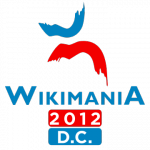
Those are diverse conferences – some more academic and others more action-oriented – and they have different thematic and disciplinary focus. However, they are all in the field of Internet/technology and society.
However, even if to a certain degree they all build upon an interconnected community of those interested in technological and societal issues, I am amazed how diverse they are in terms of gender inclusion. In other words, in terms of gender, some conferences are able to engage a diverse set of speakers and participants, in which women are also present, while others largely include almost only men in their programs. To give you an example, the organizers of Wikisym were almost all men: 89% of the Symposium Committee, 78% of the Program Committee, and 80% of the program of speakers were men (according to the data provided on the program web page).

 In contrast, in the Personal Democracy Forum, the gender ratio of speakers was more balanced and inclusive, with 60% men and 40% women speaking (according to the program).
In contrast, in the Personal Democracy Forum, the gender ratio of speakers was more balanced and inclusive, with 60% men and 40% women speaking (according to the program).
Traditionally, technological sectors (even if this is not true of all of them) were and still are majoritarily populated by males. In this regard, conferences in those sectors might be expected to reproduce this ratio, which might explain in part this strong male predominance at conferences. However, it seems to me that in some cases, some of these conferences not only reproduce the gender imbalance of the sectors they appeal to, but actually reinforce them by presenting programs with even worse percentages than those regular in these sectors. Importantly, this is not a disconnected situation. Conferences also build these sectors; the conferences also shape the gender ratios of their sector and could therefore help to improve the balance there. The gender(gap) could change, but it will not change alone, without actions for change.
In a “just do it” spirit, and in order to go more in-depth into the question of gender inclusion at Internet and society conferences, I decided to inaugurate a “pro-bono” research series called “What is the gender(gap) of….?”. It consists of a plan for doing a statistical analysis of gender inclusion at the conferences I attend. It will provide an empirically-based indicator of gender inclusion at each conference that may help to provide a more grounded comparison between each conference. I hope that “What is the gender(gap) of….?” will contribute to increasing gender consciousness, provide a more grounded picture of the question, and contribute to systematizing “best practices” in order to reduce the gender gap at Internet and technology-related conferences.
Research methodology
The research methodology itself is very simple. It is based on counting the male and female participants in every area of engaging with a conference. However, it is important to acknowledge that gender equality is more complex than gender balance (that is, the equal presence of males and females). In this study, I adopt gender balance as an indicator of gender equality, on the assumption that better gender balance might contribute to improve gender equality, even if it is not by any means a perfect indicator. It should also be acknowledged that gender is a complex construction that goes beyond the categories of female and male, such as with hermaphrodites. However, for the purposes of this study, I restricted the categorization of gender to female and male for the sake of methodological simplification. I classified people according to their names and/or appearance in pictures provided on the conference website. I considered people in as many contributory roles as I had data for: that is, I considered not only speakers and key speakers, but also organizers and attendees or testimonies.
What is the gender(gap) of …. OKFest?
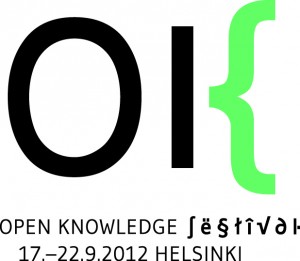
The “What is the gender(gap) of ….?” research series is inaugurated today with the case of the Open Knowledge Festival taking place in Helsinki on 17-22 September 2012. To me, the is no doubt that this is THE conference of the year for building a free and open knowledge movement world-wide. (See online schedule for live streaming: http://okfestival.org/onlineschedule/#tue.) I am part of the conference’s Advocacy Board, am part of the organizers of the stream, and have been accepted as speaker in one of the streams.
According to the analysis, overall Okfest is 73.16% male and 26,83% female. The conference role in which women are most present is as guest program organizers, at 41% women (but not core organizers, where the women drop to 20%), which is more than as speakers (27,5%) or featured speakers (19%).
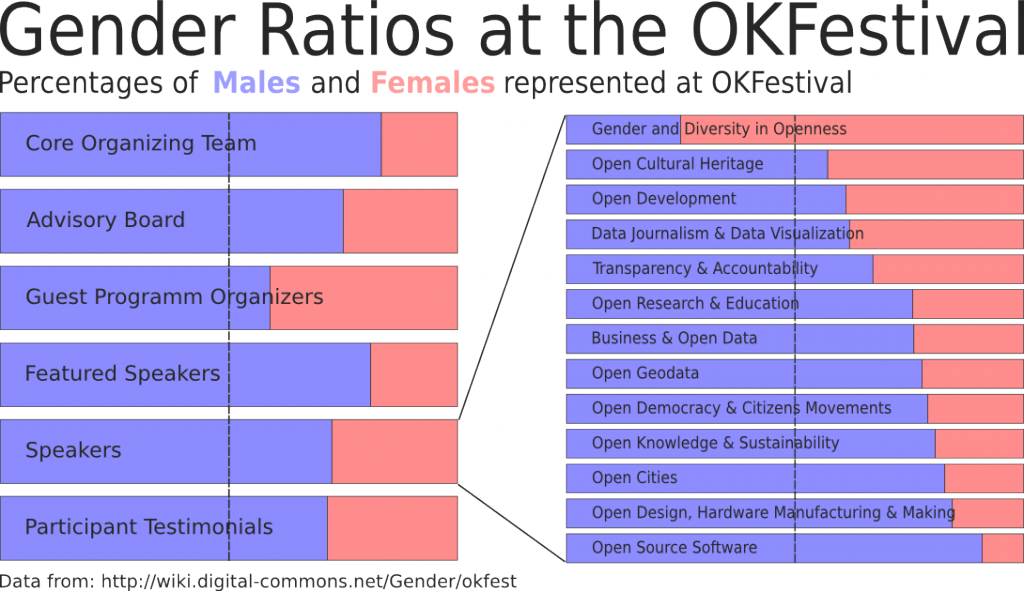
(Visualization thanks to Michael Bauer @mihi_tr)The conference is organized in 13 thematic themes linked to open knowledge. In terms of women engagement by scheme topics, “Gender and Diversity in Openness” (75% women) is the only topic stream in which women speakers are predominant, followed (at some distance) by the topic of “Open Cultural Heritage” (42,85%), “Open Development” (38,88%), “Data Journalism & Data Visualization” (38,09%), and “Transparency & Accountability” (32,96%). The topic streams “Open Research & Education” (24,24%), “Business and Open Data” (24%), “Open Geodata” (22,22%), “Open Democracy & Citizen Movements” (21%), “Open Knowledge & Sustainability” (19,35%), “Open Cities, Open Design, Hardware, Manufactures & Making” (17,24%) have fewer than 25% women, while the female presence in “Open Source Software” stands at the lowest performance with9%. Additionally, 28,5% of testimonies on the website are from women.
This data seems to suggest that including an activity that directly refers to gender in the program might be a way to improve women’s involvement in conferences. Observing the relationship between guest program organization and the number of speakers per stream seems to suggest that (in some cases) involving more women in organizational tasks tend to have a higher presence of more women in the program of speakers. However, the data does not provide strong statistically significant support for this.
And gender(gap) and … you?
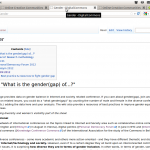
“What is the gender(gap) of…?” has a wiki spirit and format. This wiki page provides the presentation and data for each conference analysis. If you care about gender(gap), “Do it yourself, too”!. If you go to a conference on related issues, you could do a “what gender(gap)” and link a wiki page with the data on your case and your analysis. The wiki also provide a resources of best practices and a list of women expert by areas. So make/bring women’s visibility part of the show!
Wiki: What is the gender(gap) of…?
Mayo
